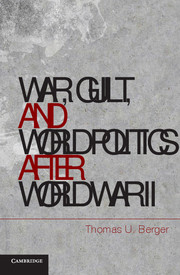2 - Germany
The Model Penitent
Published online by Cambridge University Press: 05 August 2012
Summary
The burdens of history lie heavily upon the Federal Republic of Germany. Arguably, no nation in the world has committed greater crimes in the course of the twentieth century than Germany. In the popular mind, the atrocities of the Third Reich have come to define the outer limits of state-sponsored brutality and human cruelty. As a result, it might seem natural that no other country should do more to express remorse for its actions and to atone for its crimes. Since 1945, the leaders of the Federal Republic have made great efforts to apologize for the terrible suffering Germany had inflicted on the world. At times they have literally fallen to their knees and begged for forgiveness – as Chancellor Willi Brandt did during his famous visit to the Warsaw ghetto in 1970. The German State has paid well more than $100 billion in compensation to the victims of the Third Reich, and the crimes and horrors of the nation's past are commemorated with a thoroughness unparalleled in any other country. In 1985, President of the Federal Republic Carl Richard von Weizsäcker even went so far as to suggest that Germany's willingness to face up to its past is in fact the most distinctive and praiseworthy feature of the German nation. To put it another way, Weizsäcker was arguing that not only should Germans today feel guilty for the crimes of the past, but that this guilt should itself be a source of national pride (an attitude referred to as Sűhnestolz in German).
At the same time, arguably no other nation in the world has been as richly rewarded for expressing its guilt. Since 1945, the Federal Republic has been successfully reintegrated into the community of nations. Germany's democratic virtues are widely and generally celebrated. Its economic achievements are formidable. The Federal Republic has been one of the driving forces behind European integration and generally is accepted as an important player in world affairs. So successful has the project of German rehabilitation been that in recent years Germans have been able to rediscover a sense of pride in their nation without provoking alarm and enmity among their neighbors.
- Type
- Chapter
- Information
- War, Guilt, and World Politics after World War II , pp. 35 - 82Publisher: Cambridge University PressPrint publication year: 2012
References
- 1
- Cited by



